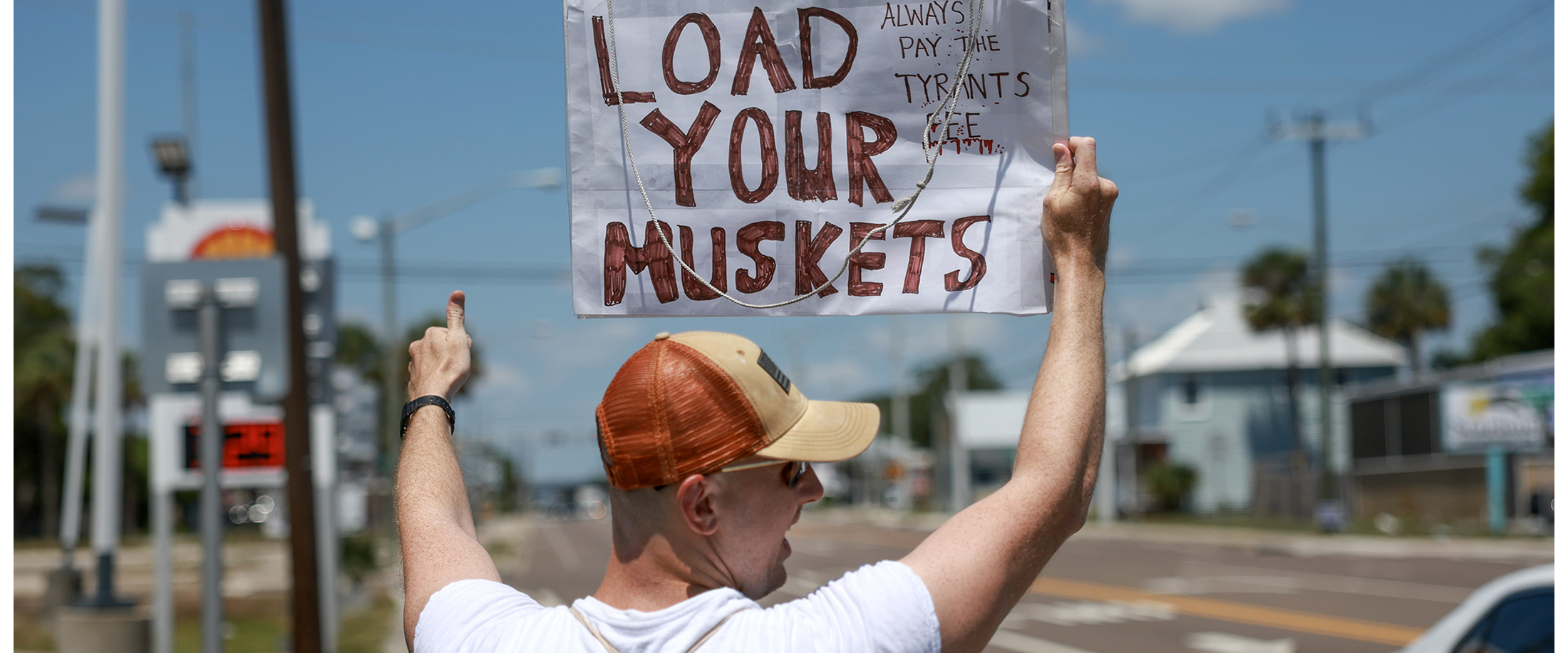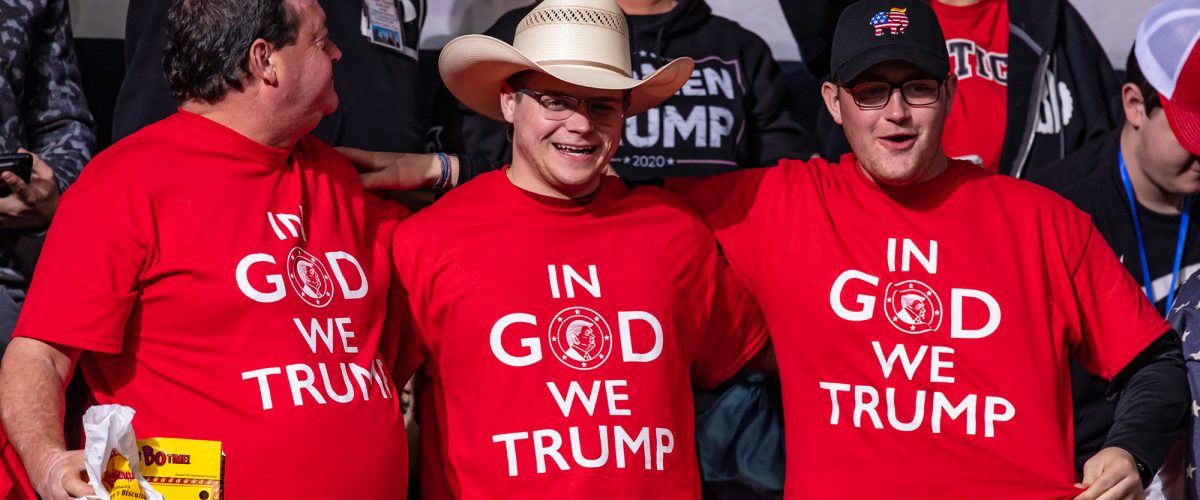After decades of progressive influence, America made a hard right turn on Tuesday, Nov. 5. Donald Trump won a decisive Electoral College vote as well as the popular vote.
I resist the notion that the nation was voting against having a woman of color as our president. While I do believe gender was the dominant issue, it is not for the reasons usually assumed. I am convinced Trump’s gender-performed masculinity was the key to the election.
Trump’s gendered performance has two foundations: A hard-core “good old boy” masculinity and a right-wing populism dominant among authoritarian foreign leaders.

Rep. Marjorie Taylor Greene (R-GA) puts on her Make America Great Again hat while addressing a campaign rally with Republican presidential candidate and former U.S. President Donald Trump at the Forum River Center March 9, 2024, in Rome, Georgia. Both Trump and President Joe Biden are holding campaign events on Saturday in Georgia, a critical battleground state two days before its primary elections. A city of about 38,000, Rome is in the heart of conservative northwest Georgia and the center of Greene’s district. (Photo by Chip Somodevilla/Getty Images)
The proverbial ‘good old boy’
I have studied and written about Donald Trump for nine years. In this time, I never have given him enough credit for being an image and media genius.
He managed to transform himself from a city slicker into the proverbial Southern “good old boy.” And he enticed more than half of America to vote for him.
“Good old boys” never have been loved before. The rest of the nation has made fun of them, caricatured them, called them “Rednecks,” and refused to allow them a place in polite society. Good old boys hung out in bars and bragged of sexual conquests. Good old boys could “hold their liquor,” “protect the girls,” and “keep their feelings private.” Nobody really liked a good old boy until the New York billionaire Donald Trump became one. As frightening as this image is, it is still an act of genius — evil genius.
In the last month of the campaign, Trump doubled down on his persona as a brash, bold, bragging, “take names and kick butt” masculine savior. His torrent of words — always ugly, vulgar, divisive, harsh, violent, disgusting and offensive — became worse. The explosion of repetitions, incomplete sentences, long rambling stories unrelated to his topic — all were intended to show Trump as the “man’s man” and Kamala Harris as a weak and ineffective candidate.
“Trump supporters saying, ‘That’s just Trump being Trump,’ were actually saying, ‘Boys will be boys.’”
This is Trump magic. Trump supporters saying, “That’s just Trump being Trump,” were actually saying, “Boys will be boys.”
Trump, the television creature, played the role of his life: the quintessential, archetypal Southern “good old boy.” And he managed this feat without drinking a single beer at the Dew Drop Inn or shooting deer or going to a drag car race.
Trump oozed the markers of the Southern good old boy: He was a fighter, a lover and a party lover. He could claim friends in low places. He could boast, brag, lie and preen with the best of them. Trump claims to love women but clearly demonstrates his lack of respect for women.
I am convinced a set of male performative strategies are central to Trump’s campaign. Trump pretended to be hurt by the replacement of President Joe Biden with Vice President Kamala Harris, but I think his hyper-masculinity relished the contest against a woman.
The first debate suggested Trump was not as cocky or confident in the face of an intelligent, tough and beautiful woman as his rhetoric usually suggests, but his deep-seated masculine performances after the debate tell us Trump not only suffered the stereotypical insecurity of the brash male, but also the tendency to fight dirty and nasty.
The masculine rhetoric dominated Trump’s speeches in the last month of the campaign. Nothing shouts “good old boy” like threatening people.
“Nothing shouts ‘good old boy’ like threatening people.”
According to NPR, “Trump has made more than 100 threats to prosecute or punish perceived enemies.” He growled if “radical left lunatics” disrupt the election, “it should be very easily handled by — if necessary, by National Guard, or if really necessary, by the military.” He claims his second term will feature “retributions.”
Kamala Harris “should be impeached and prosecuted,” Trump said at a rally last month.
“I will appoint a real special prosecutor to go after the most corrupt president in the history of the United States of America, Joe Biden, and the entire Biden crime family,” Trump said last year.
Trump’s rhetoric imbibed the “Lost Cause” of the South to the dregs. He managed to turn more than half of the nation into a version of “Lost Cause” ideology. This included the “Blue Wall states of Michigan, Wisconsin and Pennsylvania — none of which are in the South.
Trump’s genius also lies in his ability to convince his followers they are being scorned by the elites. Roderick Hart has argued the real subject of the last eight years has not been Trump, but the American people.
In Trump and Us, Hart observes: “Donald Trump knew that many Americans felt ignored, so he acknowledged them with an accessible, populist style. He knew that some folks felt trapped, and he uplifted them via emotion-filled storytelling. Others of his constituents felt besieged — by elites, especially by the media — so he offered them public therapy by becoming an alternative news source for them. Trump also sensed that many Americans were weary of the political establishment, so he used his distinct personality and a barrage of tweets to energize them.”

Mark Fuller of Titusville, Fla., holds a sign that reads, ‘Load Your Muskets,’ as he shows his support for former President Donald Trump on May 31, 2024, after Trump was found guilty of 34 felony counts. (Photo by Joe Raedle/Getty Images)
Gendered performance and rightwing populism
There also was a deeper gendered performance more dangerous than the “good old boy.” Rightwing populism has introduced a maleness that undergirds political power.
This gendered performance has shown up across the globe. One can point to several leaders in other countries who have the same populist gendered performance as Trump: Viktor Orban (Hungary), Jaroslaw Kaczynski (Poland), Nicolas Maduro (Venezuela) and Narendra Modi (India) to name a few. But the two most influential rightwing populists are Vladimir Putin (Russia) and Recep T. Erdogan (Turkey).
Putin and Erdogan have managed to hide much of their political program in an “ostentatious masculine posturing that has the virtue of being relatively malleable,” according to Betul Eksi and Elizabeth Wood. They came into power with the gendered performance of “bad boys.” They posed as outsiders, as transgressors who would be hard, tough protective fathers. They adopted “macho” approaches in their public appearances, speeches and actions.
“They successfully presented themselves as being transgressive out of necessity so they could become good fathers saving their nations.”
Both leaders produced a machismo combined with a deeper bullying, a masculine set of performances matched with a paternalistic dominance that claims to protect their own people. They successfully presented themselves as being transgressive out of necessity so they could become good fathers saving their nations by rejecting others whose masculinity they impugned by emasculating them. This combination of “bad cop”/ “good cop” produced a populist authoritarianism.
Eksi and Wood, in their article, “Right-wing Populism as Gendered Performance,” demonstrate how Putin and Erdogan share a media image as the ultimate bad boys wielding their anger and macho rhetoric in defense of their nations. But they are also, paradoxically, presented as good fathers who protect those same nations.

Screencap from pro-Trump video shared on X by Elon Musk.
Trump successfully mirrored the same gendered performances of Putin and Erdogan. His angry explosions over faulty microphones coupled with his gross stimulation of sexual acts with the microphone was a gendered performance. His attacks on immigrants, his profanity, his declarations of how angry he was, and how he would have the audio techs beaten up and he wouldn’t pay the bill for faulty equipment, his attacks on Harris, Pelosi and women in general — all gendered performance.
Trump deliberately claimed to love women and promised to protect them, “whether they like it or not.” He called Harris “a shit vice president,” claimed she was a “low I.Q. person,” and attacked her as weak.
“He chose the populist image, and it became his persona.”
Trump won the election with this combination of “good old boy” persona and the rightwing populism borrowed from Putin and Erdogan. He chose the populist image, and it became his persona. He acted the part of the “bad guy,” the evil anti-hero, the villain as an angry, transgressive leader who would get America back on track.
He projected a nativism that castigated immigrants as deficient. He played up a male-dominated and conservative set of ideas “that appear to,” argue Eksi and Wood, “restore an imagined and idealized gender order based on male dominance that will provide stability and ‘greatness’ to (America].”
The election was not so much about a biracial woman being the Democratic candidate. It was about Donald Trump being an old-fashioned “good old boy” and a populist “bad boy.” Trump gave the performance of his life — the good, the bad, and the ugly. America bought his act and elected him president.
Consider this: 54% of Latino males voted for Trump. According to exit polls, his overall share of young males increased to 47%, and his share of African American males also increased.
Trump’s male-dominant gendered performance is an old male stereotype but was a major contributing factor in his election win.
Rodney W. Kennedy is a pastor and writer in New York state. He is the author of 11 books, including his latest, Dancing with Metaphors in the Pulpit.
Related articles:
Jesus and John Wayne exposes militant masculinity in the age of Trump | Analysis by Alan Bean
For every critic of Jesus and John Wayne there are many more positive responses Du Mez says


